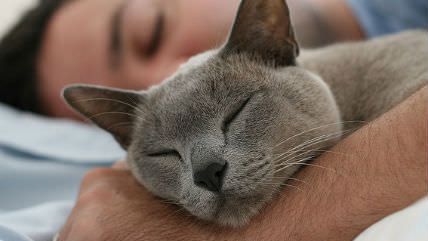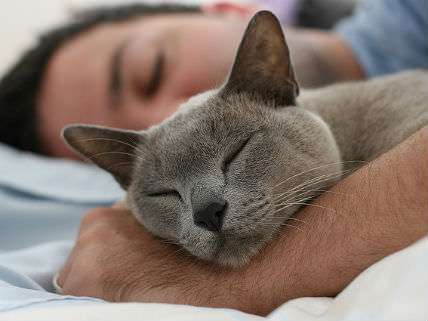Cuddles Incorporated
What's wrong with selling snuggles for $1 per minute?


Man cannot live by Tinder alone. "A ton of my male clients have said that it's really easy for them to find sex, but it's really hard for them to find someone to cuddle with," says Samantha Hess. Hess is the proprietor of Cuddle Up to Me, a Portland, Oregon, cuddling studio where Hess and three other comfortably but fully clothed women platonically embrace humanity for $1 a minute (with a 15-minute minimum).
Over the last half dozen years or so, professional cuddlers have been putting the squeeze on isolation and loneliness in San Francisco, London, Rochester, and many other cities. Hess herself started in 2013, first on an outcall basis, meeting clients at parks, movie theaters, and their homes, then opening up a retail storefront in November 2014.
While practitioners like Hess have received substantial media attention—she appeared on America's Got Talent in July, cuddling celebrity judge Neil Patrick Harris until the other judges gave her the cold shoulder—only a handful of individuals appear to be doing it in anything approaching a full-time, ongoing way. But professional cuddling is also perfectly situated for a high-stress, overstimulated, screen-dominated era that places an emphasis on self-care and efficiency. More tactile than psychotherapy, more explicitly nurturing than massage…who knows how big an industry it could become?
Professional cuddling can be misperceived as a PG-13 version of prostitution, with all the assumptions, prejudices, legal gray areas, and safety issues that that misperception creates. "Because the social norm around touch is that it's sexualized, most interactions you get as a new startup in this industry are just icky," Hess says. "I can't tell you how many times I got emails from people who were offering me absurd things. I had someone offer me $500 to make out on their couch for 15 minutes. I'm like, 'No, that's not even close to what I'm doing.'"
It's not just would-be clients who don't understand her business. "I had a hard time finding a retail space that would accept us," she says. "We got rejected by eight different places before we found this one. We have tons of massage places in Portland, but what I'm doing is definitely different. It freaked people out."
To help clarify its status as a professional and above-board industry with no connection to prostitution, the therapeutic massage industry emphasizes training and certification. Most states have massage therapy licensing boards that regulate practitioners. To obtain a license typically takes at least 500 hours of supervised, in-class training; in New York, you need 1,000 hours.
Such requirements help reinforce the idea that massage therapy is a skilled discipline practiced by experienced professionals who possess genuine medical knowledge and hard-to-acquire skills. But the pursuit of respectability comes at a price. Massage therapy isn't a particularly lucrative profession. According to the Bureau of Labor Statistics, the industry's mean annual wage was $41,790 in 2014. Obtaining the necessary training represents a significant investment, especially when many practitioners don't necessarily plan to pursue massage therapy as a lifelong career.
"It can cost 16 grand and take a year to 18 months just to get trained," says Joanna Robinson, founder of Lunar Massage, a chain of "affordable, no-frills" massage studios with four locations in Washington, D.C. "It should cost, like, six or eight grand and take no longer than six months."
Along with the training costs, some states or municipalities impose additional fees on therapeutic massage businesses. In D.C., for example, a basic business license for most retail operations costs around $190 for two years. To obtain a massage establishment license, the cost is $962.50.
Until 2012, the D.C. chief of police had to approve each massage establishment, and official city code actually made it "unlawful for any female to give or administer massage treatment or any bath to any person of the male sex, or for any person of the male sex to give or administer massage treatment or any bath to any person of the female sex" in such establishments. So you could say all the training, certification, and fees ultimately paid off.
But if professional cuddling attempts to go this route, an obvious issue arises. "There's only so much information you can give on teaching cuddling versus massage," says Evan Carp. "I'm not sure how much there is to teach."
Carp is the founder of TheSnuggleBuddies.com, a website that effectively functions as a kind of centralized cuddling marketplace. Carp hires independent contractors who offer cuddling services in 28 states. Their profiles appear on Carp's site, but potential customers can't contact them directly; they request appointments through a form that goes to Carp. Cuddling sessions ultimately take place on an in-call or out-call basis—i.e., not in a permanent retail location. Carp splits the fees with his cuddlers on a 50/50 basis: $40 an hour for him and $40 an hour for them. Currently, around 100 women and five men appear on the site.
Carp, who sought out advice from Hess when he was starting up, implements some of the same basic ground rules that she does. Customers are required to sign a waiver in advance asserting that they will not engage in any kind of sexual behavior. Cuddling sessions are fully clothed.
But overall, his is a more laissez faire operation. Customers aren't asked to provide as much personal information as Hess requires. Cuddlers aren't asked to complete any formal or even in-person training.
In Hess' opinion, this is both short-sighted and unsafe. "This isn't just about letting someone lay next to you," she says. "There's so much more to it than that. We have over 60 different cuddling positions that we use, because we see people who have disabilities and flexibility issues, or have experienced trauma," she says. "You have to know what positions are appropriate for which people, and how to create comfort and trust through the whole process."
In February 2015, Hess started offering certification workshops- $900 for a two-day course with some work to be completed in advance off-site, or $1,600 for a four-day course that's conducted entirely on-site. Those who successfully complete the workshop will eventually be listed on certifiedcuddlers.com.
"On a personal level, I don't really care about adding more laws. On a professional level, I will make my certification the gold standard of the industry," Hess says.
But however valuable the training Hess provides may be, the lack of regulation that currently characterizes professional cuddling is valuable too. Without any legal requirements in place, Hess herself was able to experiment and innovate and create a new livelihood for herself. The women and men who promote their services on Carp's site can give the profession a try with virtually no barriers to entry. At this point, when professional cuddling has a relatively tentative grip on the market, introducing a lot of requirements and regulations could impede progress rather than hasten it.
Nick Grossman, a general manager at the New York venture capital firm Union Square Ventures, has written extensively about the difference between traditional regulatory efforts and the "2.0" approach that Internet platforms like eBay and Uber employ.
Both are designed to promote trust, safety, and security. But while traditional regulation tries to do this through licensing, permits, inspection, and other top-down methods of restrictive control, platforms like eBay and Uber "freely [allow] users to act, but then hold them accountable through data and accumulated reputation." This, Grossman writes in a paper titled "Regulation, the Internet Way," creates marketplaces that are "massively scalable and also [allow] even the smallest actors to participate with minimal initial overhead."
In many ways, professional cuddling is a quintessential sharing-economy industry. It recognizes warm but platonic human contact as an asset with both underserved demand and underutilized supply, not unlike spare bedrooms and empty passenger seats. Similarly, TheSnuggleBuddies.com functions somewhat like Airbnb.com or Uber.com, creating a platform that connects cuddlers with customers. What the cuddle site lacks is a reputation system that lets parties on both sides of the transaction rate and review their interactions.
A system like that introduces privacy concerns. But it would also provide accountability on a very granular level while still welcoming any would-be professional cuddler with open arms. These practitioners would be free to innovate, iterate, and otherwise define their nascent profession in a flexible environment, unhampered by overly proscriptive rules and requirements but made safe through transparency and crowd-sourced assessment. Regulatory middlemen will likely find themselves feeling useless and unloved. Luckily for them, sympathetic shoulders will be easy to find.
